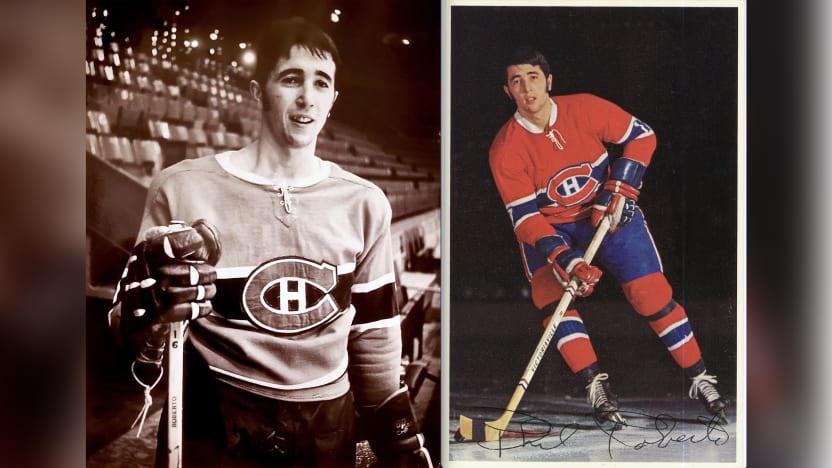MONTREAL — Phil Roberto, who played 385 NHL games between 1969-77 and famously assisted on Montreal Canadiens captain Jean Beliveau’s 500th career goal, died Wednesday.
His death, at age 76, was announced on social media by the St. Louis Blues, the second of his six NHL teams.
Roberto had 181 points (75 goals, 106 assists) for the Canadiens, Blues, Detroit Red Wings, Kansas City Scouts, Colorado Rockies and Cleveland Barons and 17 points (nine goals, eight assists) in 31 Stanley Cup Playoff games. He won the Cup with Montreal in 1971.
But it was the 22-year-old’s pass to Beliveau at the Montreal Forum on Feb. 11, 1971 that would be his most famous appearance on a scoresheet.
Roberto took a drop pass from future Hall of Famer Frank Mahovlich, then did likewise to the charging Beliveau, who deked Minnesota North Stars goalie Gilles Gilbert and tucked the puck just inside the far post for the captain’s milestone 500th.
1970-71 Stanley Cup-champion Montreal Canadiens. Bottom row, from left: Al MacNeil, John Ferguson, GM Sam Pollock, president David Molson, Jean Beliveau, VP William Molson, VP Peter Molson, Henri Richard, assistant GM Ron Caron. Second row: Rogie Vachon, Bobby Sheehan, Claude Larose, Marc Tardif, J.C. Tremblay, Rejean Houle, Jacques Lemaire, Yvan Cournoyer. Third row: Frank Mahovlich, Leon Rochefort, Phil Roberto, Ken Dryden, Terry Harper, Gilles Lapointe, Phil Myre. Top row: trainer Yvon Belanger, Larry Pleau, Peter Mahovlich, Pierre Bouchard, Jacques Laperriere, Serge Savard, trainer Phillip Langlois, trainer Eddy Palchak.
The goal completed Beliveau’s hat trick that night in a 6-2 Canadiens victory, making him only the fourth player in NHL history at the time to reach 500 goals; he followed Montreal icon Maurice “Rocket” Richard, Detroit’s Gordie Howe and Bobby Hull of the Chicago Black Hawks.
“When I was a kid, I had Jean and Frank as my heroes,” Roberto told reporters after the game. “As for assisting on Jean’s 500th goal, it’s just too much. But it’s terrific.”
Mahovlich had carried the puck over the North Stars blue line, pulling defenseman Ted Harris — a former Beliveau teammate — out of the play. “The Big M” dropped the puck to Roberto, who was being covered by defenseman Fred Barrett.
Roberto dropped a pass to Beliveau, who stickhandled in to score his 500th with Mahovlich parked at the goal post ready for a tip-in that wasn’t needed.
“I knew we had a 3-on-2 break,” Roberto said. “I saw Jean, and the defenseman was right in front of me. I wasn’t thinking about his 500th goal or anything. I just knew he had a better chance than I did and I passed the puck.
“That’s an awful lot of goals. It takes a long time to score that many. It was my greatest thrill in hockey just being on the ice for it.”
1969-70 Montreal Voyageurs of the American Hockey League. Bottom row, from left: Rejean Houle, Alain Caron, playing-coach Al MacNeil, GM Ron Caron, Jean Gauthier, Dennis Hextall, Jude Drouin. Middle row: Jack Norris, Paul Curtis, Robin Burns, Bobby Sheehan, Ronnie Robert, Phil Roberto, Guy Charron, Lyle Carter. Top row: trainer Bobby Stewart, Marc Tardif, Bart Crashley, Bob Berry, Guy Lapointe, Pierre Bouchard, trainer Noel Geoffroy.
Roberto arrived in the NHL in 1969, having been signed undrafted by Canadiens scout Claude Ruel out of his hometown Niagara Falls Flyers, an Ontario Hockey League teammate of future Boston Bruins star Derek Sanderson. A Memorial Cup winner with Niagara Falls in 1967-68, he was groomed for a season with the Montreal Voyageurs of the American Hockey League.
Immediately, Roberto was the pride of Montreal’s large Italian population, Voyageurs and Canadiens public-address announcer Claude Mouton slowly drawing out “Ro-ber-to!” in his booming baritone as he did at Jarry Park with Montreal Expos catcher John Boccabella.
“Remember the name, you’ll be hearing it a lot,” Mouton told rinkside Forum fans near his announcing position, Roberto having just scored his first NHL goal on Jan 16, 1971, his 17th NHL game, against the visiting Bruins.
A rugged forward with a chip on his shoulder, Roberto learned to play with some discipline; he had spent considerable time in the Voyageurs penalty box and too much for the liking of Canadiens coach Toe Blake early in his days with Montreal
